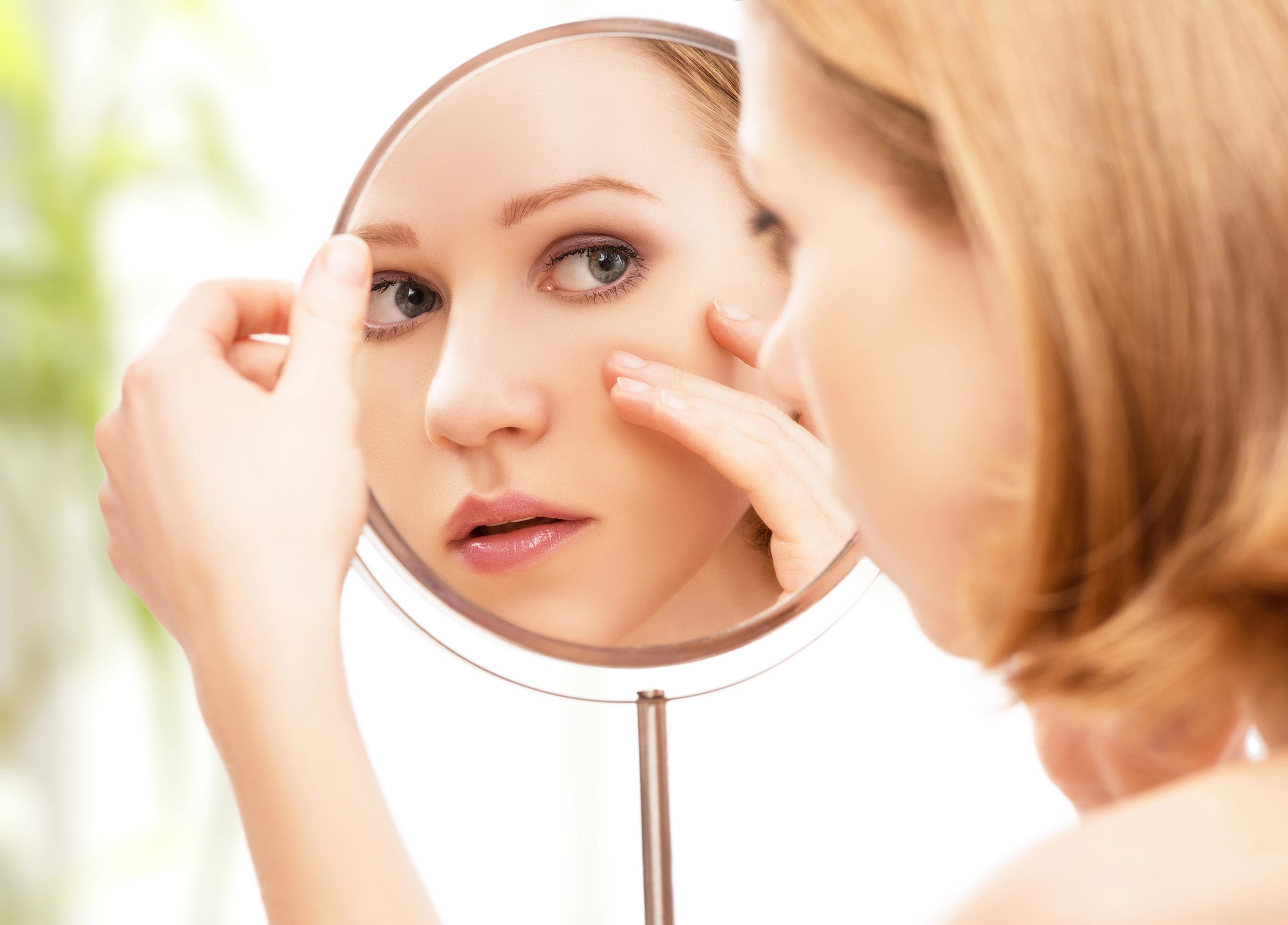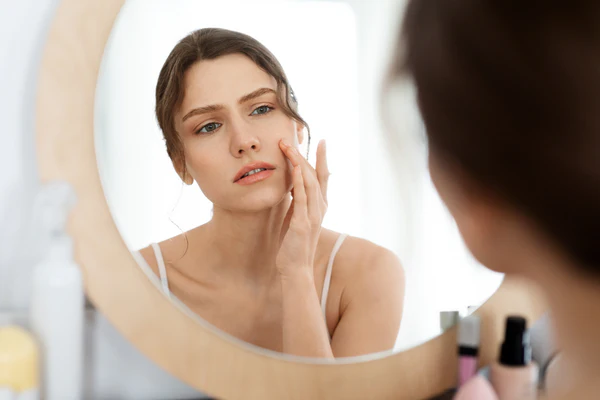

· By Sara M, Founder
How To Determine Your Skin Type—And Why It Matters
Your skin is your body's largest organ and serves as a protective barrier against the outside world. It also plays a crucial role in regulating your body temperature, preventing dehydration, and protecting you from harmful environmental factors.
Since our skin is so important, it's essential to understand its unique characteristics and needs. One crucial aspect of understanding your skin is determining its type. Your skin type can impact everything from which skincare products to use to how much sun exposure you can handle.
In this guide, we will discuss how to determine your skin type and why it matters for maintaining healthy, radiant skin. Whether you have dry, oily, combination, or sensitive skin, understanding your skin type can help you establish an effective skincare routine that caters specifically to your needs. So let's dive in and learn more about our skin types!
What is Skin Type?

Skin type refers to the natural characteristics of your skin, which are determined by genetics and can change due to various internal and external factors. Some common skin types include dry, oily, combination, and sensitive.
Determining your skin type is important because it can help you choose the right skincare products and develop a suitable routine that caters to your specific needs. Using the wrong products for your skin type can lead to issues like breakouts, irritation, or even premature aging.
Methods for Determining Your Skin Type
There are a few different methods you can use to determine your skin type. Here are three of the most popular ones:
Bare-Faced Method
Start by washing your face with a gentle, mild cleanser. After rinsing thoroughly, skip applying any other skincare products.
Wait about 25 minutes after cleansing and drying your face, then take a moment to examine it and note how it looks and feels.
If your skin feels dry and tight, it's probably dry. If it appears shiny or greasy, it's oily. If you notice both oiliness and dryness, you have combination skin. If there are no signs of oiliness or dryness, your skin is normal.
The Blot Sheet Method
This method is an excellent way to determine your skin’s oiliness—if any.
-
Without washing your face beforehand, press a tissue or blotting sheet onto several areas, including the T-zone.
-
Hold the tissue or sheet up to natural light to examine the amount of oil absorbed.
-
A significant amount of oil indicates oily skin. Minimal oil suggests combination skin, while no oil points to normal or dry skin.
For accurate results, perform this skin type test at different times throughout the day. Testing in the morning and again at night will give you a comprehensive understanding, as skin condition can vary due to several factors over time. For more details, check out this guide on skin types.
Observation Method
This method involves closely observing your skin's characteristics throughout the day and over several days.
Start by washing your face with a mild cleanser and not using any products for at least one day. Observe how different areas of your face feel and look after a few hours, then repeat the process the next day with no skincare products.
If some areas feel tight or dry while others appear shiny or oily, you have combination skin. If all areas seem to have an even balance of moisture, you most likely have normal skin. If you experience redness, irritation, or stinging in response to certain products or environmental factors, you may have sensitive skin.
Different Skin Types

Now you know how to determine your skin type let's take a closer look at the different types and their specific characteristics.
Dry Skin
Dry skin is often characterized by a lack of moisture, resulting in a tight and flaky appearance. Those with dry skin may also experience itchiness, redness, and even cracking or peeling in extreme cases.
Individuals with dry skin may have a weakened moisture barrier that leads to increased water loss from the skin. This can be caused by genetics, environmental factors such as weather changes, or using harsh skincare products.
To care for dry skin, it's essential to use gentle cleansers and avoid harsh ingredients like alcohol or fragrance. Look for hydrating and nourishing ingredients like hyaluronic acid, glycerin, and ceramides. It's also crucial to moisturize daily and protect your skin from harsh elements by wearing sunscreen and protective clothing.
Oily Skin
Oily skin is characterized by excess sebum production, resulting in a shiny and greasy appearance. Those with oily skin may also be prone to acne breakouts and enlarged pores due to the excess oil clogging their pores.
Individuals with oily skin tend to have overactive sebaceous glands, which can be caused by genetics, hormonal fluctuations, or using heavy and pore-clogging skincare products.
To care for oily skin, it's essential to use gentle but effective cleansers that can remove excess oil without stripping the skin. Look for ingredients like salicylic acid or benzoyl peroxide that can help control oil production and prevent breakouts. It's also crucial to moisturize daily with lightweight, oil-free products and exfoliate regularly to unclog pores.
Combination Skin
Combination skin is characterized by having both dry and oily areas on the face. Typically, the T-zone (forehead, nose, and chin) is oilier than the cheeks and jawline. Those with combination skin may experience a variety of skin concerns, from dryness and flakiness to acne breakouts in different areas.
The cause of combination skin can vary from genetic factors to hormonal fluctuations or using incompatible skincare products.
To care for combination skin, it's essential to use gentle cleansers that won't strip the skin of its natural oils. Look for ingredients like niacinamide or tea tree oil that can help balance oil production and reduce inflammation. It's also crucial to moisturize daily with lightweight products and focus on different areas of the face with specific skincare products as needed.
Normal Skin
Normal skin is characterized by a well-balanced complexion with even texture, minimal pores, and no significant concerns like dryness or excess oiliness. Those with normal skin may still experience occasional breakouts or sensitivity, but not to the same degree as other skin types.
The cause of normal skin is mainly genetic, but external factors like stress or diet can also play a role.
To care for normal skin, it's essential to maintain a consistent skincare routine that includes gentle cleansing, moisturizing, and using sunscreen daily. It's also beneficial to incorporate exfoliation and face masks into your routine to maintain healthy and glowing skin.
Sensitive Skin
Sensitive skin is characterized by heightened reactivity to certain products or environmental factors. Those with sensitive skin may experience redness, stinging, burning, or tightness in response to certain ingredients or triggers like weather changes.
The cause of sensitive skin can vary from genetics to allergies or underlying skin conditions like eczema or rosacea.
To care for sensitive skin, it's essential to use gentle and fragrance-free skincare products that won't irritate the skin. Look for calming ingredients like aloe vera, chamomile, and oatmeal. It's also crucial to patch-test new products and avoid harsh environmental factors like extreme temperatures or pollution. Incorporating a regular skincare routine with minimal, non-irritating products can help manage sensitive skin and keep it healthy.
Other Skin Types and Concerns

Apart from the five main skin types discussed above, there are other skin types and concerns that may affect individuals, such as:
Aging Skin
Aging skin is a natural process that occurs as we get older. It is characterized by visible signs of aging such as fine lines, wrinkles, and sagging skin. The cause of aging skin is mainly due to a decrease in collagen and elastin production, which are responsible for keeping the skin firm and supple.
To care for aging skin, it's essential to incorporate anti-aging ingredients like retinol or vitamin C into your skincare routine. Using sunscreen daily can also help prevent further damage from UV rays. Plus, regular moisturizing and exfoliating can help keep the skin hydrated and remove dead skin cells for a more youthful appearance.
Acne-prone Skin
Acne-prone skin is characterized by frequent breakouts of pimples, blackheads, or whiteheads. The cause of acne-prone skin is usually due to excess oil production, clogged pores, and bacteria on the skin's surface.
To care for acne-prone skin, it's essential to use gentle but effective cleansers that can remove excess oil and unclog pores. Look for ingredients like salicylic acid or benzoyl peroxide that can help control oil production and reduce inflammation. It's also crucial to moisturize daily with lightweight products and avoid harsh or comedogenic ingredients that can trigger breakouts.
Hyperpigmentation or Discoloration
Hyperpigmentation or discoloration is a skin concern characterized by dark patches or spots on the skin. It can be caused by sun damage, hormonal fluctuations, post-inflammatory hyperpigmentation (PIH), or underlying skin conditions.
To care for hyperpigmentation, it's important to use sunscreen daily to prevent further darkening of the affected areas. Incorporating brightening ingredients like vitamin C and niacinamide into your skincare routine can also help fade discoloration over time. In more severe cases, seeking professional treatment options such as chemical peels or laser therapy may be necessary.
Dehydrated Skin
Dehydrated skin is a condition characterized by a lack of moisture or water in the skin. It can be caused by external factors like weather changes, harsh products, and internal factors such as dehydration or certain medications.
To care for dehydrated skin, it's crucial to hydrate both internally (by drinking plenty of water) and externally (through moisturizing). Look for lightweight, non-greasy moisturizers that contain hyaluronic acid, glycerin, or ceramides to help lock in moisture. Avoid alcohol-based toners and harsh exfoliants that can further dry out the skin.
Eczema or Dermatitis
Eczema or dermatitis is a skin condition characterized by inflammation, redness, and itching. It can be caused by genetics, allergies, or environmental factors.
To care for eczema or dermatitis-prone skin, it's essential to use gentle and fragrance-free skincare products that won't irritate the skin. Look for soothing ingredients like colloidal oatmeal or ceramides to help calm and repair the skin barrier. Avoid harsh chemicals and fragrances that can trigger flare-ups. Incorporating moisturizing creams and ointments regularly can also help manage symptoms of eczema and keep the skin hydrated.
Why Skincare Matters For All Skin Types
Proper skincare is essential for all skin types and concerns. Not only can it improve the overall appearance of the skin, but it can also help prevent and manage various skin conditions.
Consistently using gentle and suitable products for your skin type can help maintain a healthy barrier function, which is crucial in protecting against external stressors like pollution and bacteria. Proper hydration and moisturization can also improve the skin's elasticity and reduce signs of aging.
Regular exfoliation helps remove dead skin cells, allowing for better absorption of skincare products. It also helps prevent clogged pores, leading to less frequent breakouts.
Taking care of your skin not only benefits its physical appearance but also contributes to overall well-being. Skincare routines can serve as self-care rituals and promote relaxation and stress relief. Additionally, properly caring for your skin can boost confidence and self-esteem.
FAQs
How can I determine if I have an oily skin type?
To determine if you have an oily skin type, observe if your skin appears shiny and feels greasy throughout the day, particularly in the oily t zone (forehead, nose, and chin). A gentle cleanser can help manage excess oil without stripping your skin of its natural moisture.
What are the signs of sensitive skin types?
Sensitive skin types often react to products with redness, itching, or burning sensations. Using a gentle cleanser designed for sensitive skin can help minimize irritation and maintain a healthy skin barrier.
Why is it important to know your skin type during the natural aging process?
Understanding your skin type becomes crucial as you age because skin's needs change over time. For instance, oily skin might become less oily, and you may need products that provide more hydration and address signs of aging like wrinkles and fine lines.
How do I identify if I have a normal skin type?
If you have a normal skin type, your skin will feel balanced, neither too oily nor too dry, with minimal imperfections. Using a gentle cleanser helps maintain this balance without disrupting your skin's natural state.
Conclusion
In conclusion, understanding your skin type and concerns is essential in choosing the right skincare products and developing a suitable routine. It's crucial to listen to your skin's needs and make adjustments as needed.
Remember to be patient with any new products or treatments and seek professional advice if you experience persistent or severe issues with your skin. With proper care and attention, all skin types can achieve healthy, radiant-looking skin. So, embrace your unique skin type and give it the love and care it deserves! Happy skincare journey!